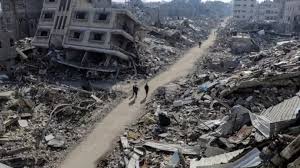
Escalating Violence Halts Polio Vaccination Campaign in Northern Gaza
As violence and displacement intensify in northern Gaza, crucial public health initiatives are coming to a standstill. The Polio Technical Committee for Gaza, comprising the Palestinian Ministry of Health, the World Health Organization (WHO), UNICEF, the United Nations Relief and Works Agency for Palestine Refugees (UNRWA), and partners, has postponed the third phase of a polio vaccination campaign intended to protect nearly 120,000 children in the region.
The initiative, initially scheduled to begin today, faces suspension due to widespread bombardment, limited humanitarian access, and a lack of secure pauses in violence.
This vaccination phase was set to deliver a second dose of the novel oral polio vaccine type 2 (nOPV2), following a successful first round across the Gaza Strip in September. With humanitarian pauses now confined solely to Gaza City—an area significantly reduced from the previous campaign—it has become increasingly difficult for children in northern Gaza to access vaccination services.
The deterioration in safety conditions endangers both the movement of families bringing their children for vaccination and the operational capacity of healthcare workers on the ground.
Health officials emphasize that achieving at least 90% vaccination coverage in every neighborhood is vital to halting the virus. The forced delay raises serious concerns about a potential poliovirus outbreak, as missing this critical second dose could weaken immunity levels among children and facilitate the spread of the virus within Gaza and beyond.
The WHO and UNICEF stress that prompt, consecutive doses are essential to strengthen immunity in children and prevent paralysis caused by poliovirus.
Since October 14, the campaign’s second phase has seen the successful vaccination of over 442,000 children under ten across central and southern Gaza, reaching 94% of the target in these areas. Additionally, nearly 358,000 children aged two to ten received vitamin A supplements, underscoring the campaign’s goal of integrating polio immunization with other vital health services.
“Humanitarian pauses are essential for a successful campaign,” stated representatives from the WHO and UNICEF, urging all parties to prioritize the safety of civilians and healthcare infrastructure. The agencies continue to advocate for a ceasefire, calling on all parties to enable the uninterrupted delivery of essential health services.